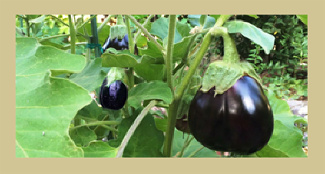
Welcome to Brinjal Crop management and Diagnostic solutions
Brinjal Cultivation : : Manures, Fertilizers & Weeding

 Manures
& Fertilizers :
The fertilizer requirement of brinjal also depends upon soil
type, crop rotation, season, genotype and the region of growing. It
was observed that brinjal grown after leguminous crop or green
manuring yield higher than following a non-leguminous or without
green manuring. About 25 tonnes farm yard manure is required for one
hectare of land. The application of micronutrients alone or in
combination with major nutrients not only increased the yield, but
improved the quality also. For open pollinated varieties a
fertilizer dose of 120 kg, 80 kg and 50 kg of NPK are recommended.
60kg N and entire quantity or P and K fertilizers applied as basal
and the remaining 60kg N applied as top dressing 30 days after
transplanting. For F1 hybrids a fertilizer dose of
180kg, 150kg and 120kg of NPK is recommended, 60 kg N and half the
quantity of P and K fertilizers are applied as basal and the
remaining quantities of P and K and 60 kg N top-dressed 30 days
after. A 3rd dose of 60kg N is applied 50 days after
transplanting. The fertilizer use efficiency also increases with
trickle irrigation, as N doze of 180 kg/ha gave same yield with drip
system as that of 360 kg/ha with furrow
Manures
& Fertilizers :
The fertilizer requirement of brinjal also depends upon soil
type, crop rotation, season, genotype and the region of growing. It
was observed that brinjal grown after leguminous crop or green
manuring yield higher than following a non-leguminous or without
green manuring. About 25 tonnes farm yard manure is required for one
hectare of land. The application of micronutrients alone or in
combination with major nutrients not only increased the yield, but
improved the quality also. For open pollinated varieties a
fertilizer dose of 120 kg, 80 kg and 50 kg of NPK are recommended.
60kg N and entire quantity or P and K fertilizers applied as basal
and the remaining 60kg N applied as top dressing 30 days after
transplanting. For F1 hybrids a fertilizer dose of
180kg, 150kg and 120kg of NPK is recommended, 60 kg N and half the
quantity of P and K fertilizers are applied as basal and the
remaining quantities of P and K and 60 kg N top-dressed 30 days
after. A 3rd dose of 60kg N is applied 50 days after
transplanting. The fertilizer use efficiency also increases with
trickle irrigation, as N doze of 180 kg/ha gave same yield with drip
system as that of 360 kg/ha with furrow
Weeding : Brinjal being a
slow-growing crop is unable to compete with fast-growing weeds
.Shallow inter-cultivation is given to remove weeds from the early
growth itself. About 3-4 hoeing are normally needed for an effective
control of weeds, proper aeration and good growth of the plants.
Mulching in brinjal with black polythene film reduces weed growth,
increases crop growth, early bearing and total yield.
Manures, Fertilizsers, weeding
